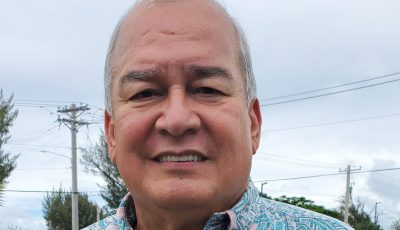HANMI says proposed standby charge ‘too high’
Nishikawa to CUC: Please give us time to recover
Hotel Association in the NMI president Nick Nishikawa yesterday labeled as “quite too high” the $20 per kW/monthly standby charge proposed by the utilities corporation—an amount he claimed is unreasonable and inconsiderate to the conditions of the hotel industry.
With the tourism business just slowly picking up, the Hyatt Regency Saipan general manager is convinced that once the proposed charge takes effect, HANMI member hotels will not be the only ones that will suffer but their employees and families as well.
“It’s quite too high ($20 per kW/monthly) and the economy is still unstable. By imposing this charge, it will be very difficult for us to continue to survive. All we’re asking is: give us some time because hotels are just slowly recovering from losses (in the past years),” Nishikawa told Saipan Tribune after yesterday’s public hearing.
When asked what amount HANMI may be comfortable in paying as standby charge, the president admitted that it would require a thorough review before a final number is given.
Nishikawa disclosed that hotels—for many years—have witnessed the insufficient capacity of the Commonwealth Utilities Co. to satisfy the power needs on island. This ultimately, he said, is the primary reason why hotels have started investing in its own power generators, fuel, and staff dedicated to it.
Unlike other establishments, he said hotels need to have uninterrupted power supply 365 days, 24-hour service for their guests.
“If we didn’t do this, our guests and potential guests may have long been gone. As they pay, we ensure that we provide the best service to them,” said Nishikawa, who claimed that the utility rate is among the biggest expense of every hotel on the island.
Under the CUC proposal, large commercial customers, to avoid paying for the proposed standby charge, have only two choices to make either to hook up 100 percent to CUC or totally get out of the CUC grid. The corporation, however, claimed that once a customer decides to physically disconnect from the grid, CUC will not at all include the hotel’s load requirement in its planning.
For Nishikawa, there are other ways on how CUC can meet its target of getting all large customers to its grid. He said transfer to the grid can be done gradually perhaps 20 percent in the first two years, 40 percent in three years, until hotels hook up to CUC completely.
At Hyatt, Nishikawa said if $20 per kW/monthly standby charge will be enforced, the cost will be more than double to the hotel. Hyatt has 260 personnel whose families, he said, might be affected if the hotel decides to reduce its workforce to minimize operational expenses.
He said the ripple effect might be larger than what is anticipated.
When asked if hotel members of the organization are capable of completely disconnecting from the CUC grid at this time, Nishikawa responded in the negative.
“Some hotels may afford it, but it would be very difficult,” he said.
Nishikawa admitted that CUC, prior to the filing of the standby charge proposal, had reached out to these large commercial customers. But Nishikawa said, the initial approach is basically enticing the hotels to completely hook up to the grid.
“Then suddenly, we came to know about this standby charge. I hope CPUC will consider our concerns. Hotels need time to recover…and obviously this won’t help us to recover,” he said.



























